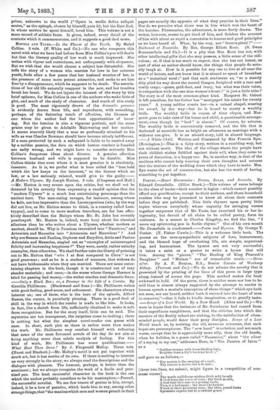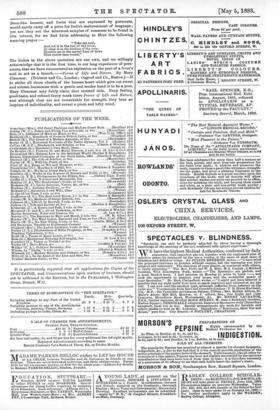POETRY.—Heart Harmonies : Poems, Songs, and Sonnets. By Edward Croasdaile.
(Elliot Stock.)—This volume of verse belongs to the class of books—their number is legion—which cannot possibly afford any gratification, except to their authors, and those household readers who may be presumed to know all about their contents before they are published. Nice little rhymes upon pretty little topics whereon everybody whose capacity for stringing verses together surpasses that of Mr. Toots, has exercised his or her in- ingenuity, but devoid of all claim to be called poetry, form its contents. In a sonnet to Charles Kingsley, we find the line, "I move my spluttering pen in feeble rhyme." Out of his own month Mr. Croasdaile is condemned.—Poem and Hymns. By George T. Coster. (T. Fisher Unwin.)—This is a welcome little book. The poems on the ever-sympathetic subjects of love, bereavement, and the blessed hope of everlasting life, are simple, unpretend- ing, and harmonious. The hymns are not very successful ; it takes a saint or a genius to write a hymn that will live. Among the "pieces," "The Healing of King Pharaoh's Daughter" and " Miriam " are of remarkable merit.—Here- after. By A. F. Heaton, B.A., Senior Curate of Worksop Abbey. (Provost and Co.)—We do not admire the novelty that is presented by the printing of the lines of this poem in large type along, instead of across the page. This method makes the book awkward to hold. Of the poem, there is neither more nor less to be said than is almost always suggested by the attempt to render in human speech a mortal's conception of those things "which eye bath not seen, nor ear heard, neither hath it entered into the heart of man to conceive,"—that it fails to kindle imagination, or to gratify taste. —Songs of a Lost World. By a New Hand. (Allen and Co.)—We were in hopes that the imitators of Mr. Swinburne had ceased from their superfluous naughtiness, and that the oblivion into which the
masters of the fleshly school are sinking, to the satisfaction of clean- minded people, would deter their puny disciples. Songs of a Lost World teach us, by reviving the old, nauseous nonsense, that such
hopes are presumptuous. The "new hand" is no better, and not much worse, except that he is appreciably more silly, than the old hands, when he babbles, in a poem called " Pausanias," about "the silver of a saying in my ear," addresses Here, in "The Passion of Ixion " as a
"Goddess-woman with brow-binding hair, Brzghter than a lily's burning halrt ;"
and goes on as follows,— " Thy motion is the swaying of a reed ; Thy stature a desire and a de-pair ;
[these two lines, we submit, might figure in a competition of non- sense verses]
Thy words mellifluous wisdom thick with breath Bused from the cores of roses; thy fresh month, A bud that blossoms in a pssaing smile, Then is a bud again ; thy dove-Ike breasts
Throb at their prisoning zone ; thy lithe, round limbs Garments express but to a sweeter yam"
Dove-like breasts, and limbs that are expressed by garments, would surely carry off a prize for foolish maltreatment of language ;
yet are they not the uttermost samples of nonsense to be found in HII‘IDLEY'S this volume, for we find Won addressing to Here the following amazing prayer :— "Take my soul, And set it in the tier of thy brow, Or clasp it on the swelling of thy sone ; Dissolve me in the amber haze of dews That clothe thee round."
The italics in the above quotation are our own, and we willingly acknowledge that it is the first time, in our long experience of poet- asters, that we have encountered an aspiration on the part of a lover's soul to act as a brooch.—Poems of Life and Nature. By Mary Clemmer. (Triibner and Co., London ; Osgood and Co., Boston.)—If to strike all those chords of the human heart which give out sweet and solemn harmonies with a gentle and tender hand is to be a poet, Mary Clemmer may fairly claim that coveted title. Deep feeling; good-taste, and refined fancy mark these Poems of Life and Nature, and although they are not remarkable for strength, they bear an impress of individuality, and reveal a pious and lofty mind.



































 Previous page
Previous page